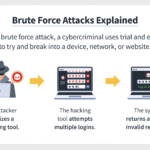The landscape of cryptography is ever-evolving, shaped by technological advancements, relentless cyber threats, and an increasing demand for privacy in a digital world. However, within this intricate domain lie profound challenges that continue to perplex experts and enthusiasts alike. This article explores the most significant problems in cryptography today, elucidating the underlying complexities that fuel ongoing debates and research.
1. Quantum Computing and Its Impending Disruption
One of the foremost concerns in modern cryptography is the rise of quantum computing. The advent of extremely powerful quantum machines threatens to dismantle many of the cryptographic protocols currently in use. Traditional encryption methods, such as RSA and ECC, rely on mathematical problems that are computationally intractable for classical computers. However, a sufficiently advanced quantum computer could leverage algorithms like Shor’s to efficiently factor large integers and solve discrete logarithms, rendering these encryption techniques obsolete.
The potential for quantum computing necessitates the urgent development of quantum-resistant algorithms, or post-quantum cryptography. Researchers are racing against time to establish secure cryptographic standards that can withstand the scrutiny of quantum machines. This shift presents challenges in standardization, implementation, and migration from existing systems, raising questions about the future integrity of data as we transition.
2. Key Management Dilemmas
At the core of any cryptographic framework is the mechanism of key management, which is fraught with complications. The security of cryptographic operations hinges upon the safeguarding and distribution of encryption keys. Poor key management practices can lead to catastrophic breaches, as illustrated by numerous high-profile examples in recent years.
One prevalent issue is the human element in key management, including inadequate training and careless handling of keys. Additionally, organizations often struggle with the complexities of maintaining a secure environment for key storage while facilitating user access. Centralized key management systems, though convenient, can become single points of failure if compromised. The rise of decentralized systems introduces potential alternatives, yet they come with their own sets of difficulties, such as governance disputes and ensuring end-user security.
3. Integrity of Cryptographic Implementations
Even the most robust theoretical cryptographic algorithms can falter when poorly implemented. Flaws in cryptographic implementations can arise from misguided designs, lack of rigorous testing, or even overlooked vulnerabilities. Notable breaches stemming from implementation errors indicate that the distance between theory and practice can be vast.
Side-channel attacks, for example, exploit information leaked during the execution of cryptographic algorithms, such as timing information or power consumption. These types of vulnerabilities underscore the necessity for developers to prioritize security in implementation, adhering to best practices and conducting thorough audits. However, the technical complexity involved in securely implementing cryptographic functions complicates this endeavor, contributing to systemic vulnerabilities.
4. Legal and Ethical Implications
As cryptography increasingly intersects with legal frameworks, ethical dilemmas arise regarding privacy, surveillance, and accountability. Governments worldwide grapple with the balance between national security interests and the rights of individuals to retain their privacy. The debate around “backdoors” in encryption systems epitomizes this conundrum, where law enforcement agencies advocate for access to encrypted communications under the veil of public safety.
The pressing question remains: can an encryption system remain secure if it is deliberately weakened for access? This dilemma places cryptographers in challenging positions, as they must consider the implications of their innovations beyond purely technical parameters. Furthermore, individuals in oppressive regimes face heightened risks of surveillance, making the ethical dimensions of cryptographic development all the more salient.
5. User Awareness and Education
Despite advancements in cryptographic technology, the awareness and understanding of encryption among the general public lag substantially. Many users employ encryption technologies without grasping how they work, leading to complacency and poor security practices. This lack of understanding is particularly concerning given the proliferation of sophisticated phishing attacks and social engineering tactics that exploit user ignorance.
To mitigate this risk, enhancing educational initiatives around cybersecurity and cryptography is crucial. Organizations must engage in outreach programs that demystify encryption, promote best practices, and cultivate a culture of security awareness. Empowering users to understand the importance of safeguarding their data can significantly reduce vulnerability to threats and enhance the overall efficacy of cryptographic measures.
6. The Challenge of Standardization
With myriad cryptographic systems and algorithms in use, standardization remains a formidable challenge. Diverse industries often develop specialized cryptographic solutions tailored to specific needs, resulting in a fragmented landscape. While specialization can enhance security, it also complicates interoperability and may hinder advancements in security protocols.
Moreover, the process of standardizing cryptography can be painfully slow, often hindered by competing interests and evolving technological landscapes. The challenge lies in achieving consensus among stakeholders, including researchers, developers, and regulators, while balancing innovation with the need for robust standards. An encompassing, adaptive approach to standardization can bolster collective security efforts and provide a cohesive framework for cryptographic development.
Conclusion
The intricate terrain of cryptography is beset with challenges that extend far beyond mere algorithms. As we navigate the complexities posed by technological advancements and human factors, addressing these problems becomes imperative. From the looming threat of quantum computing to the pressing need for better user education, the journey toward enhanced cryptographic security demands collaboration, innovation, and a commitment to ethical practices. Only by confronting these issues head-on can the cryptographic community hope to fortify the foundations of secure communication in an increasingly interconnected world.







Leave a Comment